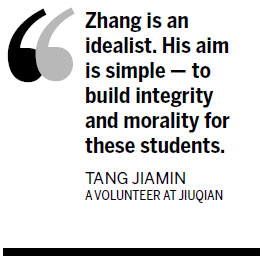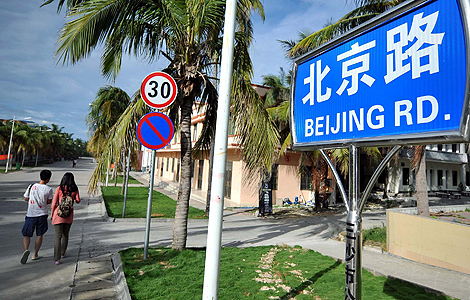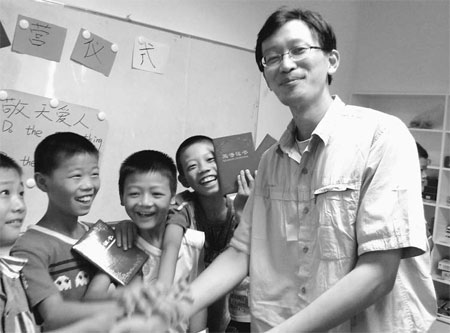Catalyst of change
Updated: 2013-07-09 06:14
By Wu Ni (China Daily)
|
||||||||
|
Zhang Yichao with migrant students at Jiuqian Voluntary Center in Shanghai. Provided to China Daily |

Zhang Yichao has a noble aim. Through his voluntary education center, he hopes to have a positive impact on the lives of migrant workers' children. He shares his dreams with Wu Ni in Shanghai.
Although widely praised as a volunteer dedicated to helping migrant children, Zhang Yichao, founder of Jiuqian Voluntary Center that provides free extracurricular education for migrant students, prefers to be called an educator - the kind that "enlightens young minds and encourages their self-awakening".
The 36-year-old Shanghai native established Jiuqian - which means hand-in-hand forever - in 2002, when he was a philosophy postgraduate at Fudan University. The center was formally registered as a nonprofit organization in 2008, with about 40 volunteer teachers giving classes related to painting, singing, and violin, as well as organizing various social activities.
Learning art, music and other skills beyond ordinary curriculum, Zhang says, is an important enlightenment for these migrant students, whose parents have left their rural homes to toil in big cities to earn a living.
At first glance one cannot tell the difference between these migrant students and any other teenagers.
Dozens of students sit randomly on the floor in the cozy classroom, surrounded by bookshelves, CD-shelves, a zither and a dulcimer. They are all neatly dressed and some have their smart phones with them.
Zhang teaches the Theory of Knowledge, a lesson that encourages students to discuss and debate open-ended issues such as whether human history is moving forward or repeating itself.
Like a mentor tutoring his disciples, Zhang, sitting in the center, gives brief comments on the views of students, ensures everyone has the chance to speak and calms over-heated debate.
"My goal is to activate their mind," he says, "as most Chinese students their age are overwhelmed with various exams. They dare not challenge authority, nor reflect on their life. But they have the chance to make up for this in universities by reading books or communicating with teachers.
"Many migrant workers' children, however, are hustled to work to share the family burden as soon as they graduate from middle school. They never have the chance to see how rich and colorful life can be."
At Jiuqian, migrant students can choose any course and come once or twice a week. But if they don't take the course seriously, Jiuqian will shut its door.
Lin Lanlan, a 17-year-old vocational school student, has been studying at Jiuqian since 2006. The girl left her hometown in Shenqiu county, Henan province, and settled with her parents in Shanghai when she was 4.
She was rude and aggressive when she first came to Jiuqian, Lin admits, saying that she did not even call Zhang teacher, but she has learned to "express her ideas in a modest manner and show more respect to others".
Tang Jiamin used to be a volunteer at Jiuqian. After graduating from university, she became one of the two full-time teachers at the center. "Zhang is an idealist. His aim is simple - to build integrity and morality for these students," she says.
Having engaged with the migrant students for more than a decade, Zhang says he has witnessed changes in the students who come to Jiuqian.
His first contact with the group was in 2001 as a college student keen to help the city's unprivileged group. The students were "free, and had some wildness in them" despite the dingy schoolhouse, broken teaching facilities and ramshackle neighborhoods.
"I brought a camera to take pictures. They rushed to surround me and jumped for my camera, without any shyness that I had expected to see," he recalls.
At that time, migrant children were not allowed into public schools. They could only attend schools meant specifically for children of migrant workers - schools of poor quality that lacked educational resources.
In 2008, the prohibition was removed under a citywide campaign to provide equal education for all. Migrant students could join other children in public schools.
A report released in June by Shanghai Normal University shows there are more than 400,000 migrant students in the city's public schools.
The situation has improved, Zhang says. Like Lin Lanlan, many migrant students, who used to work after graduating from middle school, now choose to study in vocational schools where they can receive training to become competitive in the job market.
A new policy issued by the city's educational authorities enables migrant workers to apply for different types of residence permits based on a point system. With enough points, their children can go to a local high school and take college entrance exams in the city. Previously, those who wanted to pursue higher studies had to return to their hometowns for the exam.
Zhang has observed that "the more contact the migrant students made with local students, the more disparities they could feel, which leads to a sense of inferiority".
He tried to bridge gap between the migrant students and the "rich kids" of the city, by making use of his other role as a teacher in Shanghai Pinghe Bilingual School, a private boarding school in Shanghai's Pudong New Area that only well-off families can afford.

He invited students in Pinghe School to do voluntary work in Jiuqian and organized activities involving students from both sides. "Neither of them shows strong interest in the other's life. Consciously or unconsciously, they may have labeled themselves as from two different worlds."
Jiuqian aims to enlighten the migrant students so that they can face adversities confidently and design their life based on what they can achieve, Zhang says.
"These students would not like to be like their parents, who are satisfied with a monthly salary of 3,000 yuan ($488). They grow up in the city and naturally yearn for the best part of it. When they can not get what they want, they easily jump into conclusion that the city is unfair to them.
"Without conscious self-awareness, they will live a life dominated by desires. They may succeed or fall, I am not sure, but they will be lost," he says.
Contact the writer at wuni@chinadaily.com.cn.
Hua Wenjing in Shanghai contributed to the story.
(China Daily USA 07/09/2013 page10)

 Thousands flock to Texas Capitol over abortion
Thousands flock to Texas Capitol over abortion
 China's youngest city glistens under palm trees
China's youngest city glistens under palm trees
 Xinjiang tourism recovering
Xinjiang tourism recovering
 Quebec disaster death toll jumps to 13
Quebec disaster death toll jumps to 13
 Mourn for students in San Francisco air crash
Mourn for students in San Francisco air crash
 Rolling stone finally settles
Rolling stone finally settles
 Double-decker bus caught fire in Shanghai
Double-decker bus caught fire in Shanghai
 China, Russia begin live-fire navy drill
China, Russia begin live-fire navy drill
Most Viewed
Editor's Picks

|

|

|

|

|

|
Today's Top News
China improves maritime law enforcement
Air crash victims' families arrive in SF
Hopes are high for US, China talks
Laden's life on the run revealed
US mulls hastening withdrawal from Afghanistan
China's inflation grows 2.7% in June
Country singer Randy Travis in critical condition
Police look for suspects in Brazil soccer slaying
US Weekly

|

|








